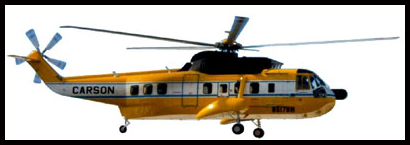
A judge has refused to reduce the sentence for Steven Metheny, 50, the former Vice President of Carson Helicopters whose falsification of records for a Sikorsky S-61N helicopter under contract to the U.S. Forest Service led to the deaths of nine firefighters and crew members.
Metheny was accused of falsifying performance charts and the weights of helicopters his company had under contract to the U.S. Forest Service for supporting wildland fire operations. As of a result of his fraud, a Carson helicopter crashed while trying to lift off with too much weight from a remote helispot on the Iron 44 Fire on the Shasta-Trinity National Forest near Weaverville, California in 2008. He was sentenced to 12 years and 7 months in prison in 2015 for attempting to defraud the government out of more than $32 million and has been serving time in Lompoc, California.
Nine people were killed, including the pilot-in-command, a U.S. Forest Service check pilot, and seven firefighters. The copilot and three firefighters were seriously injured.
Below is an excerpt from a June 16, 2020 article in the Mail Tribune:
…[Metheny] argued last year that he wouldn’t have pleaded guilty in November 2014 to a count of conspiracy to commit mail fraud and wire fraud in U.S. District Court in Medford for lying about helicopter weight limits — which caused the Aug. 5, 2008, Iron 44 crash near Weaverville, California — had he known crash victims were going to be allowed to testify at his sentencing, or that he’d be ordered to repay tens of millions of dollars in restitution upon release from prison.
In a 13-page court order filed May 27, U.S. District Court Judge Ann Aiken denied Metheny’s motion to vacate or correct his June 2015 sentence, saying it doesn’t match Metheny’s allegations of ineffective counsel by his defense lawyer, Steven Meyers, nor does it match the court record.
Judge Aiken also presided over Metheny’s trial.
Metheny went to great lengths after the crash to attempt to conceal the fraud. When he knew that investigators would be examining the company’s operations, he directed other employees to remove weight from other similar helicopters, including taking off a fuel cell and replacing a very heavy battery with an empty shell of a battery. Some of the employees refused to participate in that deception, with one explaining that he was done lying about the helicopter’s weight.
During the trial defense lawyer Steven Myers argued that the helicopter pilot could have avoided the crash by doing a standard maneuver on takeoff, where the pilot hovers and checks his gauges.
Judge Aiken dismissed that argument, noting her father had flown helicopters in the Korean War, crashing 13 times. “Whether the gauges were right or not, the pilot didn’t have the right information,” Aiken told Metheny.
The Forest Service awarded contracts to Carson, including option years, amounting to over $51,000,000. Carson received $18,831,891.12 prior to the FS canceling the contracts.
Levi Phillips, 45, the former maintenance chief of Carson Helicopters, agreed to cooperate with authorities in the case against Mr. Metheny and pleaded guilty to a single charge of fraud. He was sentenced to 25 months in prison to be followed by 3 years of supervised probation.
According to the National Transportation Safety Board, there was “intentional wrong-doing” by Carson Helicopters that under-stated the weight of the helicopter and over-stated its performance in the documents they provided to the U.S. Forest Service when bidding on their firefighting contract. The NTSB estimated that the actual empty weight of the helicopter was 13,845 pounds, while Carson Helicopters stated in their contract proposal that the weight was 12,013 pounds. For the purpose of load calculations on the day of the crash, the pilot assumed the weight to be 12,408 pounds, which was 1,437 pounds less than the actual weight estimated by the NTSB. According to the NTSB, for the mission of flying the firefighters off the helispot that day, the helicopter was already over the allowable weight even without the firefighters on board.
In Mr. Metheny’s plea agreement there was an admission that the helicopters had not actually been weighed.
Killed in the crash were pilot Roark Schwanenberg, 54; USFS check pilot Jim Ramage, 63; and firefighters Shawn Blazer, 30; Scott Charlson, 25; Matthew Hammer, 23; Edrik Gomez, 19; Bryan Rich, 29; David Steele, 19; and Steven “Caleb” Renno, 21. The copilot and three other firefighters were seriously injured.
Thanks and a tip of the hat go out to Kelly. Typos or errors, report them HERE.

Thank you for covering this. Today is the 12th anniversary of the crash and it means so much to see others continuing to remember and recognize what happened. The Fire community has always been incredible.
I’d like to think that my testimony during his sentencing is what he is referencing.
Jake – Scott’s Brother
If you’ve ever needed a chopper to save your life (uh-huh), you can relate to this and the nine families now without . . . !
Beyond ‘the truth’ . . . there’s no apology . . . but he survives to pay the piper to infinity beyond. . . as we watch.
How awesome is it that Aiken’s dad was a helicopter pilot? Wonder if the defense lawyer knew that going in?
If not murder he should have been convicted of the criminal offense of voluntary manslaughter
Proof positive that you can run but you can’t hide. Sooner or later the truth wins out!